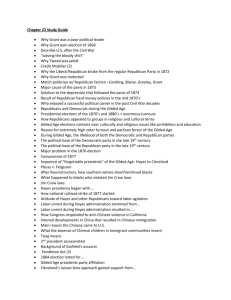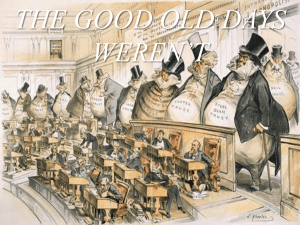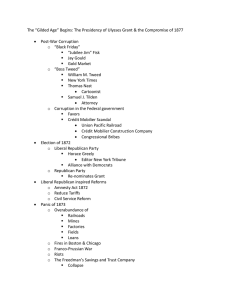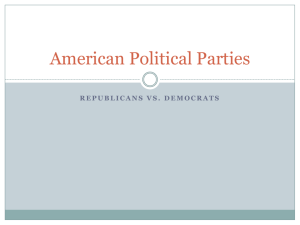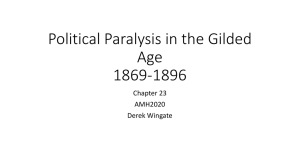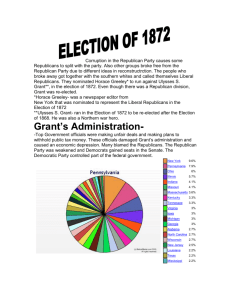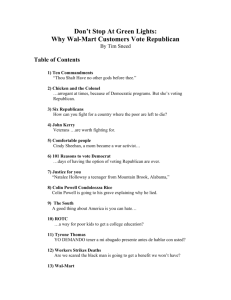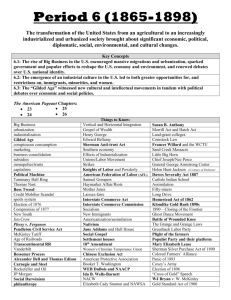American History II: Note Set #9: Gilded Age Politics "The Gilded
advertisement
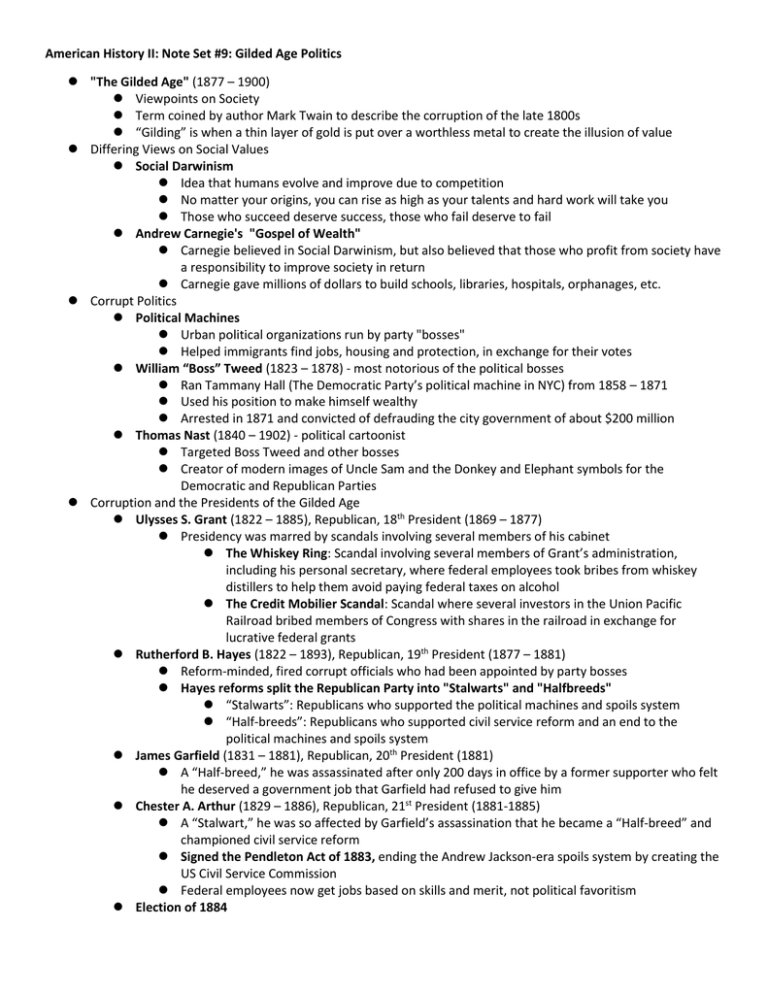
American History II: Note Set #9: Gilded Age Politics "The Gilded Age" (1877 – 1900) Viewpoints on Society Term coined by author Mark Twain to describe the corruption of the late 1800s “Gilding” is when a thin layer of gold is put over a worthless metal to create the illusion of value Differing Views on Social Values Social Darwinism Idea that humans evolve and improve due to competition No matter your origins, you can rise as high as your talents and hard work will take you Those who succeed deserve success, those who fail deserve to fail Andrew Carnegie's "Gospel of Wealth" Carnegie believed in Social Darwinism, but also believed that those who profit from society have a responsibility to improve society in return Carnegie gave millions of dollars to build schools, libraries, hospitals, orphanages, etc. Corrupt Politics Political Machines Urban political organizations run by party "bosses" Helped immigrants find jobs, housing and protection, in exchange for their votes William “Boss” Tweed (1823 – 1878) - most notorious of the political bosses Ran Tammany Hall (The Democratic Party’s political machine in NYC) from 1858 – 1871 Used his position to make himself wealthy Arrested in 1871 and convicted of defrauding the city government of about $200 million Thomas Nast (1840 – 1902) - political cartoonist Targeted Boss Tweed and other bosses Creator of modern images of Uncle Sam and the Donkey and Elephant symbols for the Democratic and Republican Parties Corruption and the Presidents of the Gilded Age Ulysses S. Grant (1822 – 1885), Republican, 18th President (1869 – 1877) Presidency was marred by scandals involving several members of his cabinet The Whiskey Ring: Scandal involving several members of Grant’s administration, including his personal secretary, where federal employees took bribes from whiskey distillers to help them avoid paying federal taxes on alcohol The Credit Mobilier Scandal: Scandal where several investors in the Union Pacific Railroad bribed members of Congress with shares in the railroad in exchange for lucrative federal grants Rutherford B. Hayes (1822 – 1893), Republican, 19th President (1877 – 1881) Reform-minded, fired corrupt officials who had been appointed by party bosses Hayes reforms split the Republican Party into "Stalwarts" and "Halfbreeds" “Stalwarts”: Republicans who supported the political machines and spoils system “Half-breeds”: Republicans who supported civil service reform and an end to the political machines and spoils system James Garfield (1831 – 1881), Republican, 20th President (1881) A “Half-breed,” he was assassinated after only 200 days in office by a former supporter who felt he deserved a government job that Garfield had refused to give him Chester A. Arthur (1829 – 1886), Republican, 21st President (1881-1885) A “Stalwart,” he was so affected by Garfield’s assassination that he became a “Half-breed” and championed civil service reform Signed the Pendleton Act of 1883, ending the Andrew Jackson-era spoils system by creating the US Civil Service Commission Federal employees now get jobs based on skills and merit, not political favoritism Election of 1884 Republicans nominated former Speaker of the House and Sec. of State James Blaine, but many voters believed he was corrupt due to his implication in several railroad scandals Democrats ran Governor of New York Grover Cleveland, who was seen as honest due to his open admission of fathering a child out of wedlock with a mistress Grover Cleveland (1837 – 1908), Democrat, 22nd & 24th President (1885-89, 1893-97) Fought for political reforms, but at the same time was willing to use military force to limit labor unions (Pullman Strike) Cleveland even won support from reform-minded Republicans (called Mugwumps) Benjamin Harrison (1833 – 1901), Republican, 23rd President (1889 – 1893) Had the first “billion dollar government” - federal budget exceeded $1 billion for first time Ran on campaign of supporting high tariffs Grover Cleveland Returns! 1892: Cleveland was nominated by Democrats again and defeated both the Republican candidate Harrison and the new Populist Party’s candidate James B. Weaver Shortly after taking office, US experienced the Panic of 1893 (financial crisis) William McKinley (1843 – 1901), Republican, 25th President (1897 – 1901) Defeated William Jennings Bryan in 1896 election, and won re-election in 1900, but was assassinated in 1901 by an anarchist Political Reforms By the End of the Gilded Age Secret ballot voting: individual’s votes would be kept secret, not published Referendums: allows citizens to vote directly on important issues rather than leave the issues in the hands of elected officials Recall Elections: allows voters to remove an elected official from office before their term is up Initiatives: allows voters to force elected officials to vote on a certain issue The Government Begins to Regulate the Monopolies Wabash v. Illinois - 1886 Supreme Court decision Court ruled that states cannot regulate railroad companies because railroads are engaged in interstate commerce which can only be regulated by the federal government Interstate Commerce Act of 1887 Reaction to Wabash v. Illinois decision Created the Interstate Commerce Commission to regulate railroads by restricting rates and ensuring that no discriminatory practices were used The McKinley Tariff of 1890 Raised the tariff on imported goods to nearly 50% Passed Congress as part of a political deal: Republicans got the tariff, Democrats & Populists got the Sherman Silver Purchase Act (which increased the amount of money in circulation) Tariff severely hurt farmers, but greatly helped industrialists Sherman Antitrust Act of 1890 First federal law limiting trusts, monopolies, and cartels, but not really enforced until Theodore Roosevelt’s presidency Designed to protect competition and to protect consumers from the dangers of monopolies United States v. EC Knight Co. (1895 Supreme Court decision) First test of the Sherman Antitrust Act EC Knight Co. was a sugar refinery that had a monopoly on sugar in US Court ruled that the Sherman Antitrust Act could limit monopolies only in distribution (interstate commerce), not in the manufacture of goods
